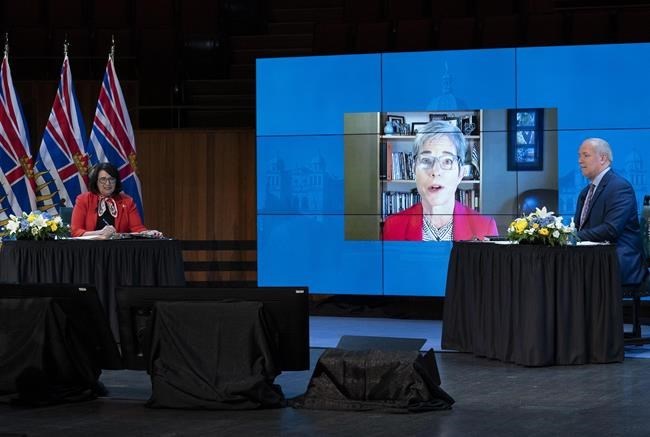VICTORIA — British Columbia is showing signs of rebuilding its economy despite the ongoing and still uncertain impact of COVID-19, Finance Minister Selina Robinson says.
Employment is steady after sharp declines in March and April, and the government forecast calls for three per cent economic growth next year, she said Thursday.
However, Robinson said the immediate impacts of the pandemic have hit hard, with a projected budget deficit of $13.6 billion in this fiscal year and predictions that B.C. won't see the economy perform to pre-pandemic levels until at least late next year.
Robinson provided the update as B.C. politicians prepared to leave the legislature following a two-week session called to pass a pandemic recovery fund promised during last October's election, which saw the New Democrats re-elected to a majority government.
The legislation that was expected to pass Thursday allows for pandemic recovery payments of $1,000 to eligible families and $500 to individuals.
Robinson said the cost of the recovery payments will be about $1.7 billion.
"This update is a snapshot of where we are today," Robinson said at a news conference. "2020 has been tough. We've experienced one of the most difficult years in the province's history. We have faced economic, emotional and social challenges of COVID-19, together with resilience again and again."
She said while some of the numbers in her update are bleak, there are signs "that our economy is en route to recovery as well."
The government predicted in September that the province would end the year with a $12.8 billion deficit.
In February, it projected a budget surplus of $227 million for 2020-21, but that was before the impact of the pandemic.
Robinson said job growth in B.C. since April has rebounded to 98.5 per cent of pre-pandemic levels.
"That's the highest job recovery rate of any of Canada's four largest provinces," she said. "While we're not quite where we began, the unemployment rate in B.C. has been steadily declining since mid-year, reaching 7.1 per cent in November."
But Robinson said workers in the recreation, hospitality and tourism sectors as well as youth and women continue to feel the harsh impact of job losses.
B.C.'s economy is forecast to decline by 6.2 per cent this year, with growth expected to rebound to three per cent next year, but the uncertainty of the pandemic will delay a full recovery, she said.
"The economic outlook assumes that provincial, national and global economic activity does not return to pre-pandemic levels until late 2022 or early 2023," Robinson said.
The government will table its budget on April 20 after legislation was passed allowing the government to delay its introduction from the traditional date in February.
“We’ve been through a year like no other,” Robinson said. “The path forward remains uncertain.”
The Opposition Liberals said the government could have done more to help struggling families and businesses during the sitting of the legislature.
Interim Liberal Leader Shirley Bond said the NDP introduced legislation to delay the budget to suit its needs.
"Very disappointing," Bond told a news conference. "There was an opportunity to do so much more. Why are there so many issues the government isn't tackling?"
She called on the government to reverse its cut to monthly pandemic disability payments from $300 to $150 starting in January. Bond also wants the government to offer help to the province's decimated restaurant sector and implement an immediate job-creation strategy.
Robinson said B.C. has spent more than $10 billion on measures related to COVID-19, including almost $2 billion in pandemic relief funds.
This report by The Canadian Press was first published Dec. 17, 2020.
Dirk Meissner, The Canadian Press



